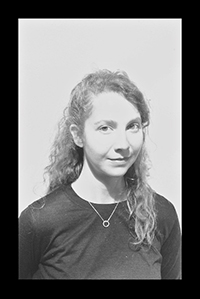Collisions of Language: Alana Friend Lettner in Conversation with Jordan Abel

Malahat Review volunteer Alana Friend Lettner discusses writing contests, Jordan's book Injun, and privilege and politics within writing with Long Poem Prize judge Jordan Abel.
Jordan Abel is a Nisga'a writer from Vancouver. Abel’s creative work has recently been anthologized in Best Canadian Poetry (Tightrope), The Land We Are: Artists and Writers Unsettle the Politics of Reconciliation (Arbiter Ring), and The New Concrete: Visual Poetry in the 21st Century (Hayword). Abel is the author of The Place of Scraps (winner of the Dorothy Livesay Poetry Prize), Un/inhabited, and Injun (winner of the Griffin Poetry Prize). Currently, Abel lives in Edmonton where he teaches Creative Writing and Indigenous Literatures at the University of Alberta.
What do you think the role of the writing contest is for writers within the context of their own writing practice? Do you think that contests are useful?
To be totally honest, I think contests can be a tough thing to factor in to a writing practice. For me, I think the best writing practices come from an interior place. That is to say, that they come from within somehow. As a writer, I’ve often found the writing contest (particularly the general literary magazine writing contests with the usual categories of poetry, fiction, nonfiction etc.) to be a really convenient point of access to a subscription to that magazine if I already had a creative piece ready to send out that happenedto fit the interests/scope of that contest. That being said, I think writing contests can open up a space for unique genres/subgenres that may not get a lot of attention otherwise. The long poem, for example, is a wonderful form that I think deserves more time, more space, and more attention. And I think contests like this one help to carve out that room.
I think that the central anxiety of the long poem is that it must somehow justify its own length. Do you think that writers of long poems have to ignore this anxiety, or engage with it? What are some long poems that you love, and how did they convince you to keep reading?
I’ve always thought that a piece of writing should be however long it needs to be. If that means it’s one page, then that’s cool. That’s probably a poem. If that piece is forty pages, then that’s cool too. Maybe it’s a long poem. If that piece is eighty pages, maybe it’s a book. If that piece is three-hundred pages, maybe it’s a long book. I think, for me, it’s really a question of what we mean when we talk about something as poetry. A lot of people have different ideas about what a poem is or what poetry is about. But I’m pretty okay with poetry being anything, and I have absolutely no desire to draw a line around it and/or to police those boundaries. In fact, I am the most interested in work that breaks out of the usual forms. Which is one of the reasons why I find the long poem (and also just longer works of poetry) to be among the most exciting. For example, I really love M. NourbeSe Philip’s book Zong! and Tommy Pico’s book Nature Poem. Both of which are long poems/book length poems.
A friend and I were recently discussing the different effects that reading has on us. When my friend reads he has a feeling of permeability, of something external to him entering him with the possibility of transforming him completely. The stakes for him are very high; this transformation is not superficial or trivial. In your experience, has a book or writer effected a transformation of this kind? Did you recognize immediately that you were being transformed as you were reading, or did that recognition come later?
For sure. Reading can be a deeply impactful process that changes how we think, how we feel etc. Personally, I’m not sure if there was one single text that I’ve read that transformed my thinking, but there were absolutely a number of texts that shifted my thinking. That being said, I am totally open to reading a transformative text at any time!
Elsewhere you have spoken about finding the “audible pathways” through the words in your collection Injun, and about the importance of observing the unusualness of language in the old western novels that you used as source material. While reading Injun, particularly the section [NOTES], I was reminded of the ways in which saying a word over and over again can render it so unusual that its meaning is neutralized. The word becomes sound. What was the experience of repeating these words like for you? Why is unusualness important in the context of decolonization?
So in the NOTES section, the idea was to present concordance lines for many of the loaded words that appear throughout the main poem in the book. I would say it’s definitely a gesture that asks the reader to engage contextually. To read both before and after the chosen word, and to think about how that word is deployed within the text. I think you’re right to say that process of reading those words over and over again does often negate their meaning and move those words towards becoming a kind of sound object. Likewise, I think unusualness (if I’m remembering the right moment you’re referring to) comes up in my discussions of Injun when I’m talking about how I cut the long poem together, and how I tended towards placing fragments of sentences together that resulted in unusual collisions of language. In those moments, I was really very interested in subverting the way that language comes together/works in the western genre. As a whole though, I’m not quite sure if unusualness is a concern for me (although perhaps unsettling/unsettled language might actually be a concern of mine), but I think in this instance unusualness proved useful in the dismantling of settler-colonial language and subsequent redeploying of that language in a new context.
Much of your work has been viewed through a political lens. This seems inevitable given the continuing colonial history of Canada and your identity as a Nisga’a writer. But can a work of art ever be apolitical? Is being apolitical a privilege? An impossibility? A delusion?
I’ve run in to this question a few times when I teach Creative Writing, and I would definitely say that every work is political in some way. Even the works that want to describe themselves as being apolitical (and/or simply without politics) are in fact taking a political position. I would also agree that writing apolitical work (and/or discussing that work as being apolitical) is intertwined with privilege in some ways. There are, of course, many different forms of privilege and difference, but for many writers being political is actually not a choice at all. Being Nisga’a and writing about my experiences is an inherently political process that positions me within and in relation of Indigeneity.
You are doing your PhD at Simon Fraser on the intersection between Digital Humanities and Indigenous Literary Studies. What do you find compelling about the interaction between human beings – embodied, sensuous, physical – and digital technologies? And how can engaging with such technologies and their methods enrich the study of Indigenous literature?
So I am doing a PhD at SFU, but my area of research interest has changed dramatically over the last few years! Which is a real thing that happens in PhD programs. Or at least it happened to me. I think it’s not necessarily a disinterest in the intersections between DH and Indigenous Literatures, but rather a desire to write about residential school violence and intergenerational trauma from a personal/reflective position. Without getting into too many details, though, my initial starting point in DH stemmed from an interest in accounting for the hundreds and hundreds of books of Indigenous poetry that are underrepresented in scholarship about Indigenous Literatures. Many non-Indigenous scholars are interested in a lot of those digital tools on their own, but my interest in those digital technologies was mostly about trying to figure out how to talk about many of these wonderful books by Indigenous writers that we very rarely talk about.

Alana Friend Lettner
* * * * * * * *









